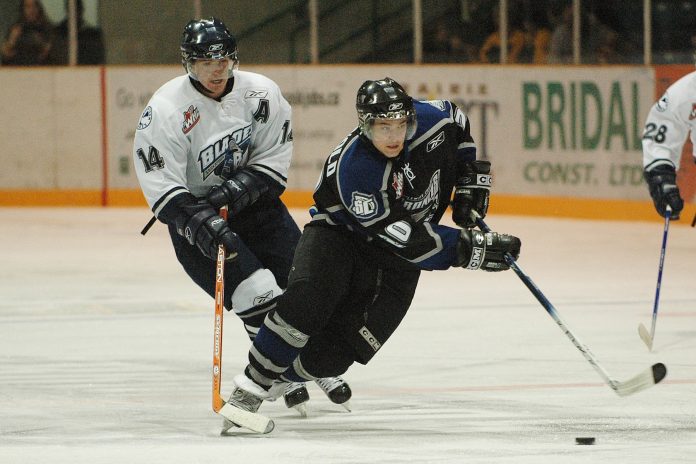Brady Leavold always had something to say. The Port Coquitlam, BC native played parts of five seasons for the Swift Current Broncos from 2003-07 with a blend of skill and abrasiveness that made him fan favorite in his home barn and one of the most hated players in the Western Hockey League.
He eventually played for four different professional teams in the East Coast Hockey League, the American Hockey League, the Central Hockey League, and a brief stint overseas. But it was his off-ice transgressions that made headlines as his life became consumed by addiction, which eventually led to homelessness, overdoses, and multiple trips to prison. Leavold ran the gamut of drugs from cocaine, to OxyContin, to heroin and fentanyl.
Today, Leavold, 32, has been clean for five months. He is bunkered down in a cottage near Muskoka in Ontario with his girlfriend, a baby on the way, and he seems to have a fresh outlook on life. He has found solace and purpose in a newfound endeavor, his podcast Hockey 2 Heroin – The Road 2 Recovery.
The first episode dropped on March 31 when he interviewed childhood friend Kevin Pederson, who is now a scout with the Arizona Coyotes. By May 3 he had posted a total of 13 podcasts.
“My whole point and my whole purpose in doing it was I say just if I can help just at least one person. Whatever that looks like, whether it’s to do with addiction, or abuse, or maybe a guy is having trouble playing junior hockey, moving away from home or whatever. If I can just help one person, share my story, create some friendship, or introduce somebody to the right person because of this outlet that if they can get the help that maybe they wouldn’t have, that’s ultimately my goal.”
Leavold may say that he’s diving headfirst into the podcast to help others, but often it sounds like therapy for himself.
“I’ve gotten so much more out of it then I ever could have thought. Even just from the support standpoint, one, people that I have never met or would have had the chance to talk to or hear their stories if I didn’t take this chance and do this, that’s been really good. Two, it’s helped my relationship with my dad a lot and building some of these relationships that I have lost along the years.”
Broncos fans will hear some familiar voices on the podcast, including Brad McEwen, Sheldon Kennedy, Brent Sopel, Michael Hengen, and Hall of Famer Terry Ruskowski, who coached Leavold with the Rio Grande Valley Killer Bees in the CHL.
“Being able to be open, it’s been really helpful. When I’m on a podcast talking to somebody, especially the ones with Brent Sopel or Sheldon Kennedy where they are more of an intimate conversation about deeper issues, it’s almost like a mini meeting. They say a meeting for NA or AA is a group of two people or more. All you need is a group of two people to have a meeting. That’s what I could never have anticipated is that’s what it’s been like,” said Leavold, who added that Sopel has quickly become a mentor to him.
To say that that the podcast has been successful would be an understatement. Unable to work due the COVID-19 pandemic, Leavold has been reaching out to potential guests from around the hockey world and was looking forward to upcoming appearances from Chris Nilan and Theoren Fleury.
Leavold has recently signed on with the Hockey Podcast Network. On April 30, the podcast was seventh on the Apple hockey podcasts list, up 42 spots from the previous rankings.
“Maybe I won’t stay there, but that was really cool,” said Leavold, who added that he sent a screenshot to his dad, who was impressed. “That text from my dad when he said ‘Wow,’ that really lit me up because it was like maybe my dad can be proud of me about something again.”
Leavold’s highest profile guest so far has been Sheldon Kennedy, who is synonymous with the Swift Current Broncos after surviving the 1986 bus crash and leading the Broncos to the 1989 Memorial Cup all while suffering years of abuse at the hands of head coach Graham James. Kennedy was named to the Order of Canada in 2014 for his advocacy work on the issue of child abuse.
“What an amazing experience. I looked up to Sheldon a lot,” said Leavold, who recalled seeing Kennedy’s name all over the Broncos dressing room and the outlandish point totals he registered with the Broncos after watching him rollerblade across Canada as a youngster.
“I reached out to him and when he got back to me I was so surprised. I was like jumping around like a little kid at Christmas. I was so excited.”
Early in the podcast, Leavold revealed that he had been the victim of sexual abuse at a very young age, something he had only revealed to a few people closest to him.
“He broke those walls down right away and I felt comfortable enough to talk to him about it. That may be because he’s been doing this for 20 years and he’s a seasoned pro at it, but at the same time I felt like he cared and that he understood. There’s no words to describe that,” he added.
He said that opening up about his childhood abuse was a painful experience.
“I listened to it the next morning, the same morning that the article came out. That was a really emotional day. I almost [expletive] lost it that day, I really did. I ended up picking up the phone and making the right phone call that I needed to make instead of going off and doing what I used to do. But it was hard listening to it,” said Leavold, who added that he started an argument with his girlfriend, threatened to break up with her, and admitted that he likely needs some counseling to address the abuse.
Leavold has a complicated legacy in Swift Current, perhaps not the alumnus the Broncos would roll out the red carpet for. He was the only current player included in Gare Joyce’s 2006 article Denial of Death, a scathing critique of the Broncos and Swift Current for failing to hold a proper memorial for the 20-year anniversary of the 1986 Broncos bus crash, which killed four players.
“Whatever happened years back, we pay the price,” Leavold said in the article. “I feel comfortable with the guys on the team, but I don’t know if I’ll ever feel comfortable with Swift Current. We’re here to play for the people, but truth is they want nothing to do with us.”
“I understand why people were mad, but I really don’t,” he says today. “It was just high school drama that I was talking about. If I was those guys at that high school I would have been doing the same thing.”
“It wasn’t me ever saying I don’t know if I’ll ever feel comfortable with the town of Swift Current. That’s not what I said. I feel very comfortable with the town of Swift Current, I’ll say that. I didn’t feel comfortable in the high school is my point, I didn’t. I was always looking over my shoulder.”
But Leavold says that those few sentences did not accurately portray his feelings about his time in Swift Current before he was traded to the Kelowna Rockets during his overage season.
“I loved it. I still consider myself a Bronco to this day. Yes I am a Kelowna Rocket alumni. I had a wonderful season in Kelowna, the best year of hockey in my life. I was just in a good head space there. That’s nothing to do with Swift Current. I met some of my best friends in Swift Current. My billets were fantastic, I cannot say enough about my billets.”
Leavold said he was disappointed that he was made the scapegoat for that article that sent shockwaves through the Broncos and its passionate fanbase.
“If they wanted to be mad at me be mad at me that I walked away from the team as an 18-year-old or that I got a girl from Swift Current pregnant and didn’t man up, left. Those are reasons to be mad at me. Don’t be mad at me because I told the story of what happened to me when I was 17 years old.”
“I was never bashing Swift Current. I always enjoyed my time in Swift Current. I was really sad when I got traded even though I knew it was necessary,” he added.
Leavold said that during some of his lowest points in life he even thought if he could get back to Swift Current he might be able to escape his addiction.
“There was times when I was messed up where I was considering moving back there just to get away. I was like maybe if I move back there, this was even before I went to jail when I was in B.C., I was thinking I need to get out of here… I remember thinking multiple times, maybe if I move back there, get my life together, and just start showing up at that rink and helping out and maybe I’ll get a job with the team. Maybe I could do some volunteer scout work for them and take hits or shots for the games and then work my way to do some skills on the ice. This is what I was thinking.”
He recently put his skates in for the first time in years, a pair the Broncos had sent him after being released from jail. He still remembers the ice at the iplex fondly.
“There is not better ice. I have skated on so many rinks everywhere. That is the best ice anywhere in the world. I feel like I’m twice as fast on that ice. I loved playing there. It’s my favorite rink to play in in the entire world.”
Leavold was only released from his most recent incarceration in November of 2019. In addition to the podcast, he is also interested in doing public speaking to share his experience at schools or with hockey teams. “That is where I want to focus my energy and just be an outlet for hockey players coming up.”
Leavold also has some exciting coaching opportunities in Ontario. “I’m not ready for that. I’m not going to take any of them at this time as much as I’d love to. I’m just not ready. I’d love to take on a smaller role just to start because I don’t want to jump in right now.”
He also hopes to release a book chronicling his abuse, addiction, mental health issues, and hockey experience in the future, but admitted that work on that project has been slowed by his focus on the podcast. Leavold starting jotting stuff down for the book in 2015 when he was in jail. “I probably wrote 300-400 pages of all over the stuff, just stories and stuff I remember.”
For now Leavold is thankful that he has found something outside of hockey that he is passionate about.
“It’s allowing me to figure out myself. It’s building these new relationships and it’s allowing me new opportunities, so it’s been fantastic.”
He said he will continue to be open about his past.
“Even though it’s all this bad stuff and a lot of negative attention, that’s why I’m getting all the attention because of all the negative things that I have done, I can turn this into a positive. I am and I really feel that that part of my life is done. I feel like I have a responsibility almost now.”
Leavold knows better than anyone that his addiction and mental health issues are a daily battle as he looks to set out on the right path and avoid another relapse.
“I’ve made it very clear to people that I talk to that if I do have a relapse I’m going to be honest. I’m going to come right on the podcast and be like, ‘Hey listen I relapsed,’ because I want to be authentic, I want to be honest.”
He is focused on moving forward though.
“Everything I say on there is the truth. I don’t need to make stuff up. I wish I had to make stuff up. That’s how unfortunate some of these choices that I have made are. They have made for some unbelievable stories. Unbelievable stories! Shit you see in the movies. But that’s my life and honestly, other than the time away from my kids and the one that I’ve never met, I wouldn’t change anything, I wouldn’t, I really wouldn’t. Every experience that I had, from being homeless on Hastings to being in jail to playing in the Western Hockey League, to whatever, they’re all my experiences and they’ve made me who I am.”





